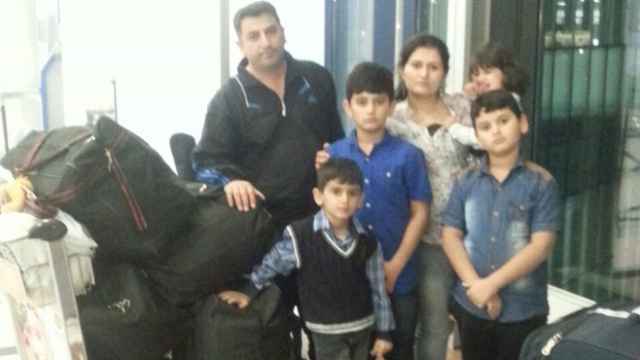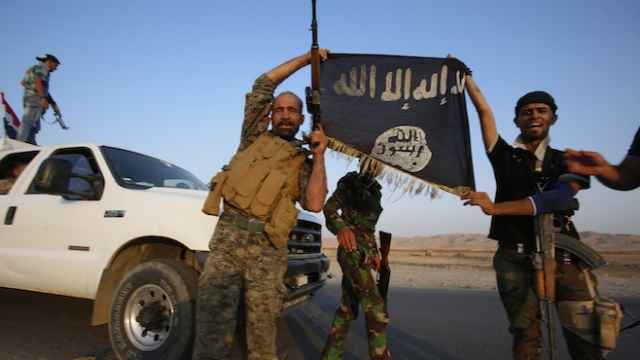Iraq may request Russian air strikes against Islamic State on its soil soon and wants Moscow to have a bigger role than the United States in the war against the militant group, the head of parliament's defense and security committee said on Wednesday.
"In the upcoming few days or weeks, I think Iraq will be forced to ask Russia to launch air strikes, and that depends on their success in Syria," Hakim Zamili, a leading Shi'ite politician, told Reuters in an interview.
The comments were the clearest signal yet that Baghdad intends to lean on Russia in the war on Islamic State after U.S.-led coalition air strikes produced limited results.
Russian military action in Iraq would deepen U.S. fears that it is losing more strategic ground to rivals in one of the world's most critical regions.
Russia is weighing in behind President Bashar Assad with air strikes in Syria while its ally Iran holds deep sway in Iraq, including military advisors who help direct the battle against Islamic State.
Iraqi Prime Minister Haider Abadi has said he would welcome Russian air strikes on Islamic State militants in Iraq and powerful Iranian-backed Shi'ite militias hope for a partnership with Russia to counter U.S. influence.
"We are seeking to see Russia have a bigger role in Iraq. … Yes, definitely a bigger role than the Americans," Zamili said.
Shi'ite militias, long mistrustful of the United States, see Russia's intervention as an opportunity to turn the tables.
"The Russian intervention came at the right time and right place and we think it will change all rules of the game not only in Syria but in Iraq also," said Muen Kadhimi, an aide to Hadi Amiri, the most powerful Shi'ite militia leader.
"The government has been relying heavily on an untrustworthy ally, which is the United States, and this fault should be fixed."
Message to Washington
Russia's drive for more clout in the Middle East includes a new security and intelligence-sharing agreement with Iran, Iraq and Syria with a command centre in Baghdad.
"We believe that this center will develop in the near future to be a joint operation command to lead the war against Daesh in Iraq," said Zamili, using a derogatory Arabic acronym for Islamic State, which is also known as ISIS or ISIL.
Washington has been pressuring Abadi to rein in Shi'ite militias, angering forces seen as a bulwark against the ultra-hardline Sunni Islamic State, the biggest security threat to oil producer Iraq since the fall of Saddam Hussein since 2003.
"The sort of support for us, or all other resistance groups for that matter, should be on the level of training, providing weapons and also serious air support," said Jaafar Hussaini, spokesman of the Kata'ib Hezbollah Shi'ite force.
Abadi was frustrated by the U.S.-led coalition's performance against Islamic State, which has threatened to march on Baghdad and wants to redraw the map of the Middle East.
Military sources said army commanders complained in a letter sent to Abadi in early September of inadequate U.S. support in the battle for Iraq's biggest refinery near the town of Baiji, a focal point in the campaign to dislodge Islamic State.
Abadi was incensed by tough accusations by U.S. officials that Iraqi government troops lacked the will to fight the militants, government sources said.
Delayed delivery of U.S. arms was one of the factors that pushed Abadi to strike a security deal with Russia, the sources said.
"We are still losing lives and losing billions of dollars in oil revenues by purchasing arms from United States, but what we really got from them was only promises and dozens of delayed arms deals," said Zamili.
"After a whole year, Daesh is still growing and thousands of fighters are still flowing to both Iraq and Syria and it is controlling more areas. That's clear evidence the United States has no clear plan or a real strategy."
Baghdad-based analyst and former army general Jasim Bahadli said tensions with the United States were one of the reasons why Abadi turned to Moscow for help.
"Abadi, it seems, succeeded in sending a clear message to the American administration, which repeatedly blamed Abadi's forces for recent setbacks, that there is another alternative for Iraq to resort to in the fight against Daesh if you are not willing to show real support," he said.
"The United States has been worried by the growing influence of Iran in Iraq and worries should be doubled after the Russians took the lead in Iraq and Syria."
Despite his frustrations with Washington, Abadi risks becoming isolated by a new dynamic dominated by Russia.
He has depended heavily on U.S. support and is at odds with the militias and their Iranian backers.
But with Islamic State showing no signs of weakening, the priority will be finding a formula for stability and key players are embracing Russia.
"There's a need to create a new coalition and force that is actually effective on the ground and performs the actual goal of fighting Daesh," said Mohammed Naji, another aide to Amiri.
"There is a serious discussion and inquiry into requesting the Russian air forces to conduct air strikes against Daesh positions in Iraq."
A Message from The Moscow Times:
Dear readers,
We are facing unprecedented challenges. Russia's Prosecutor General's Office has designated The Moscow Times as an "undesirable" organization, criminalizing our work and putting our staff at risk of prosecution. This follows our earlier unjust labeling as a "foreign agent."
These actions are direct attempts to silence independent journalism in Russia. The authorities claim our work "discredits the decisions of the Russian leadership." We see things differently: we strive to provide accurate, unbiased reporting on Russia.
We, the journalists of The Moscow Times, refuse to be silenced. But to continue our work, we need your help.
Your support, no matter how small, makes a world of difference. If you can, please support us monthly starting from just $2. It's quick to set up, and every contribution makes a significant impact.
By supporting The Moscow Times, you're defending open, independent journalism in the face of repression. Thank you for standing with us.
Remind me later.





